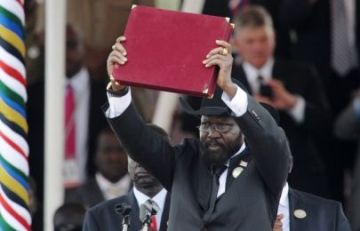S. Sudanese communities urged to protect constitution
September 29, 2014 (JUBA) – A South Sudanese official has urged citizens to protect the country’s Transitional Constitution, describing it as the guiding document for those interested in positions of power.

“As law-abiding citizens of this country, it is our duty to resist the rebels and protect our constitution,” environment minister Yai told the South Sudanese community gathered at a New York function.
He specifically cited unity, nationalism, nation-building and national cohesion as prerequisites for peaceful coexistence, harmony, development, economic growth and prosperity in the country.
“Unity was the key to our survival of the liberation war. Unity was the key to achieving our independence and freedom. Unity is the key to addressing our current crisis. Unity will remain the key to our success in the future. We have no option or alternative other than to embrace unity. So, we must continuously promote unity. Each and every one of us must resolve to promote unity,” he stressed
“Peace is our only choice. For this reason, we must reaffirm our commitment to peace today,” added the minister.
Yai further told citizens to shun bullets and stick to ballots as the only means by which power can be transferred from one person to another in a democratic and peaceful manner, but not forcefully.
“Ballots, rather than bullets, are the means by which we change guards in a democracy. In accordance with democratic principles and the constitution and the law, we conducted the general elections in 2010 and we elected President Salva Kiir Mayardit [as] president of the government of Southern Sudan,” he said.
Also elected, the minister noted, were lawmakers in both the national and state legislative assemblies and that none of these citizens took power by force. They were elected by the people.
“So, let us adhere to the democratic principles of rule of law, accountability, transparency, free and fair elections”, he explained.
MERE PUBLIC RELATIONS
A senior opposition official, however, described the minister’s remarks as “mere public relations” aimed at cleaning the image of a country badly damaged by its performance and the conflict.
“What the good minister has attempted to do was mere public relations with intention to sell the version of the government about the conflict and to clean the badly hurt and dented image of the government he serves. We are actually not surprised given the behavior of those in power corridors,” said Abdallah Kuot, the spokesperson for rebels under the command of Gen. Dau Aturjong.
Kuot, a former member of parliament, said the minister’s statement on democracy was mere “rhetoric” and a “smokescreen”.
“Who does not know the state of affair of South Sudan? If there was a democracy in the country, why did not the president resort to violence as a means to silence voices advocating for democratic reforms within the SPLM and the country at large? Why are security forces raiding and confiscating newspapers in Juba for covering different views about the conflict and the system of governance?” asked Kuot.
He said “weak leaders” were taking advantage of “ethnic solidarity”.
“I call on our people to make clear distinction between national interest and ethnic solidarity. South Sudan as a country is bigger than tribes. When we fought in the first struggles, we did not use ethnic solidarity. We all fought as South Sudanese for common cause,” he remarked.
He said they are fighting for equality, justice, freedom and development on equal opportunities, democratic system and governance.
“We wanted respect for human dignity and to live in free, just, democratic, prosperous and the country in which constitution is the only supreme law of the land. We wanted the country which upholds rule of law so that all the citizens are treated fairly before the court. But the present reality is that the country is being run by the rule of one man and his group of friends and relatives”, Kuot further said.
(ST).
